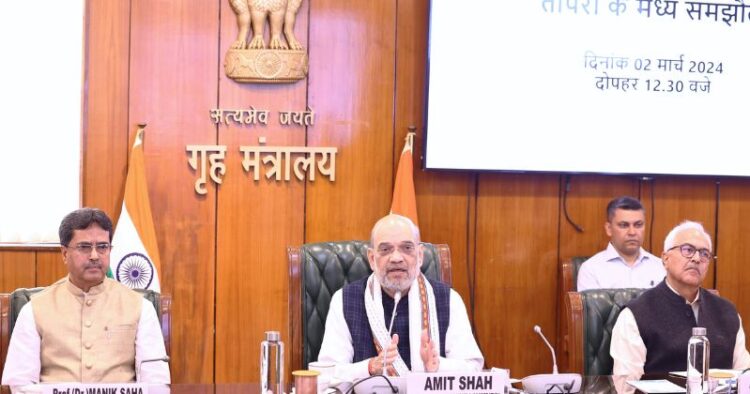Agartala: Ending a long pending political issue among tribals of Tripura, Union Government on March 2, inked an agreement with Tripra Motha in New Delhi. In a momentous event witnessed by Union Home Minister Amit Shah, a tripartite agreement was inked in New Delhi. The pact involved the Government of India, the Government of Tripura, and the Indigenous Progressive Regional Alliance (TIPRA), commonly known as Tripra Motha, alongside other key stakeholders.
Addressing the significance of the agreement, Home Minister Amit Shah emphasised its historical import for Tripura. He expressed the view that by acknowledging history, making amends, and adapting to present realities, the region is poised for a promising future. Shah acknowledged the constructive role played by Tripra Motha and tribal parties in this transformative process.
Highlighting Tripura’s commitment to Prime Minister Narendra Modi’s vision of a developed India, Home Minister Shah outlined the state’s determination to contribute significantly. He commended the efforts of the Ministry of Home Affairs, led by Prime Minister Modi, in fostering a Northeast that is free from insurgency, disputes, and violence. Shah noted that various agreements under the Modi government have led to the integration of around 10,000 individuals into the mainstream, fostering an environment of development.
Union home minister Amit Shah pointed out the series of agreements starting with the Bru-Reang agreement in 2019, emphasising the Modi government’s commitment to resolving conflicts through dialogue. With the latest agreement, Tripura takes a significant step towards becoming a dispute-free state, ensuring that citizens no longer need to struggle for their rights.
The comprehensive pact addresses indigenous people’s concerns related to history, land, political rights, economic development, identity, culture, and language. To facilitate the implementation of agreed-upon points, a Joint Working Group/Committee will be formed, working towards an honourable and time-bound resolution. A crucial aspect of the agreement is the commitment from all stakeholders to refrain from protests or agitation, fostering a conducive atmosphere for implementation.
Signing the agreement on behalf of TIPRA was Pradyot Debbarma, the founder of TIPRA, along with other representatives. Prof. (Dr.) Manik Saha, Chief Minister of Tripura, and senior officials from the Ministry of Home Affairs, Government of India, and the Government of Tripura were also present during this historic moment.
This tripartite agreement, witnessed by Union Home Minister Amit Shah, marks a historic day for Tripura. It addresses indigenous people’s concerns comprehensively, ensuring a dispute-free future. The pact includes key points related to history, land, political rights, economic development, identity, culture, and language. The commitment to refrain from protests creates a conducive atmosphere for implementation. Tripura Royal Scion Pradyot Debbarma, the founder of TIPRA, signed the agreement on behalf of the organisation. The article provides insights into the agreement’s historical significance, emphasising the Modi government’s commitment to dialogue and conflict resolution.



















Comments